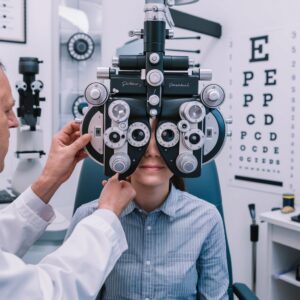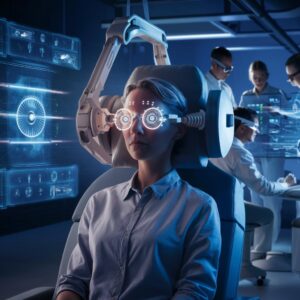Improving Vision: Exploring Effective Eye Sight Therapies
Health and happiness depend on clear vision. It helps people navigate, do daily duties, and appreciate their surroundings. Many persons with vision impairments need eyesight therapy to improve their quality of life. Traditional corrective glasses and advanced laser eye surgery enhance vision and ocular health.
Enhancing one’s vision goes beyond mere visual acuity. It’s all about improving your quality of life. Not only does it provide physical benefits, but it also has positive effects on one’s psychological and emotional well-being. A clearer perspective can elevate confidence, foster self-reliance, and positively impact emotional well-being. Improving communication and building solid interpersonal connections can enhance social interactions and relationships.
In addition, maintaining good vision is crucial for achieving success in academic and professional endeavours. It enables individuals to perform effectively and maximise their capabilities. Effective eyesight therapies are crucial as they positively influence various aspects of everyday life.
Focus Points
- Having a clear vision is essential for maintaining optimal health and overall well-being.
- Various methods are available to enhance vision, such as corrective and contact lenses.
- Additional methods, such as natural and holistic approaches and eye exercises, can be used to enhance vision.
- State-of-the-art technologies such as laser eye surgery and implantable lenses provide effective solutions for vision correction.
- To maintain optimal vision, it is crucial to incorporate lifestyle changes, including a nutritious diet and consistent eye examinations.
 Traditional Methods of Improving Vision
Traditional Methods of Improving Vision
Exploring an Alternative: Contact Lenses for Vision Correction
Alongside glasses, contact lenses have gained significant popularity as a preferred option for vision correction. These sleek, contoured lenses rest effortlessly on the eye’s surface, offering an expansive field of vision that surpasses that of conventional eyewear. Many people prefer contact lenses because they are convenient and can correct a more comprehensive range of refractive errors.
Advantages of Contact Lenses
There are numerous advantages to using contact lenses for vision correction. These include enhanced peripheral vision, minimised distortion, and freedom from the weight and obstruction of glasses. They are well-known for their popularity among athletes and individuals leading active lifestyles, offering enhanced stability during physical activities. In addition, a wide range of contact lenses are available, including soft, rigid gas permeable, and hybrid lenses, which offer personalised choices tailored to individual requirements and preferences.
Trustworthy Options for Improved Eyesight
In general, the tried-and-true methods of enhancing eyesight with corrective lenses and glasses continue to be dependable and efficient solutions for numerous individuals seeking sharper vision.
Alternative Therapies for Eye Sight Improvement
Alternative therapies for vision improvement prioritise natural and holistic approaches and standard procedures. These effective therapies target the root causes of visual impairments and support overall eye health. Consider utilising eye exercises and relaxation techniques as a potential solution.
These exercises, like palming, eye-rolling, and focussing on nearby and distant objects, are increasingly recognised for improving eye flexibility and coordination. In addition, the growing trend towards natural therapies such as herbal supplements and vitamins highlights their potential advantages in enhancing eye health.
Research has shown that incorporating omega-3 fatty acids, as well as vitamins A, C, and E, can contribute to improved eyesight and a reduced likelihood of developing eye conditions associated with ageing. In addition, alternative therapies like acupuncture and acupressure are believed to enhance the flow of energy and restore balance within the body, potentially leading to improved eye health. Although not suitable for all vision disorders, alternative therapies can be a valuable addition to standard methods. They are a helpful resource for individuals seeking natural remedies to enhance their vision.
Advanced Technologies for Vision Correction
Discover state-of-the-art technology that offers lasting benefits to individuals seeking advanced vision correction options. A significant advancement in the field of vision correction is laser eye surgery, which has revolutionised the way we improve eyesight. This procedure utilises advanced laser technology to reshape the cornea, effectively correcting refractive defects and potentially eliminating the reliance on glasses or contact lenses.
Experience the remarkable success of laser eye surgery, which offers a multitude of long-lasting vision benefits to countless individuals. Implantable lenses are a highly advanced choice for correcting vision. These lenses are expertly implanted in the eye to replace the natural lens or address refractive issues.
With implantable lenses, individuals can achieve clear vision at different distances without relying on external devices. These lenses offer a long-term solution to vision disorders, providing a permanent fix for improved eyesight. Other advanced surgical treatments are available for vision correction, including phakic intraocular lenses and refractive lens exchange. These advancements in ophthalmology demonstrate the field’s continuous development and offer promising solutions for individuals seeking lasting relief from visual impairments.
 Lifestyle Changes for Better Vision
Lifestyle Changes for Better Vision
Alongside therapies and technology, lifestyle adjustments are crucial for maintaining optimal eyesight and preventing eye diseases. The role of diet and nutrition in maintaining optimal eye health cannot be overstated, as specific nutrients are essential for preserving good eyesight. Incorporating antioxidant-rich foods into your diet, like leafy greens, carrots, berries, and fish, can provide valuable protection for your eyes against age-related disorders such as macular degeneration and cataract formation.
Furthermore, it is crucial to prioritise proper hydration by consuming ample amounts of water. This practice is vital for sustaining optimal eye health and preventing dryness and discomfort. Regular eye exams and screenings are crucial for maintaining clear vision. These checks are designed to detect eye diseases early, enabling prompt intervention and treatment.
Thorough eye examinations are crucial in assessing visual acuity, eye coordination, depth perception, and overall eye health. In addition, they are responsible for closely monitoring eye-light changes over time and making necessary adjustments to corrective methods. By making simple adjustments to their daily habits, individuals have the power to proactively maintain their vision and prevent potential problems down the line.
Vision Therapy for Children and Adults
Tackling Vision Conditions
Our specialised therapy targets amblyopia (lazy eye), strabismus (crossed eyes), and eye tracking or focus issues.
Tailored Exercises and Activities
With a range of tailored exercises and engaging activities, vision therapy supports children in cultivating essential visual skills, enhancing eye coordination, and improving visual processing abilities. Vision therapy is not only beneficial for children, but it can also provide advantages for adults who are experiencing vision issues due to conditions such as traumatic brain injury or stroke.
Enhancing Visual Performance
By implementing specific exercises and therapies, individuals can experience a substantial enhancement in their overall visual function by addressing underlying visual issues. Discover the potential of vision therapy to transform the lives of individuals facing vision-related difficulties. This innovative approach targets and resolves specific visual challenges through personalised interventions, offering a ray of hope.
 The Future of EyeSight Therapies
The Future of EyeSight Therapies
With the rapid advancement of technology, the field of eyesight therapy is poised to offer an array of cutting-edge techniques to enhance vision. Cutting-edge technologies like adaptive optics and wavefront technology are revolutionising vision correction by providing personalised solutions to correct higher-order aberrations in the eye. The result significantly improves the clarity and precision of vision correction. Moreover, gene therapy can revolutionise the field by precisely targeting genes linked to inherited eye disorders, offering a potential solution to the genetic roots of blindness.
In addition, regenerative medicine techniques utilise stem cells to address retinal cell damage and treat degenerative eye conditions like retinitis pigmentosa and macular degeneration. These exciting advancements in ophthalmology indicate the possibility of groundbreaking treatments that have the potential to revolutionise the field of vision correction in the near future. Through ongoing research and innovation, the field of eyesight therapy is on the brink of significant advancements that will significantly improve the lives of individuals with various visual disorders.
Ultimately, vision therapies are vital in enhancing vision and maintaining optimal eye health. Individuals searching for improved vision have a wide range of choices. These options include traditional methods, such as corrective lenses and advanced technologies like laser eye surgery. Exploring alternative therapies can provide a holistic approach to improving vision, complemented by essential lifestyle adjustments like maintaining a balanced diet and scheduling regular eye exams.
At Vision Therapy, we provide tailored interventions for individuals of all ages who have specific visual issues. We are constantly exploring new technologies and treatments to enhance our vision in the future. Through thorough research into various methods of improving vision, individuals can discover the most suitable solutions for their specific needs. As a result, they can enjoy the advantages of sharper vision and improved eye health.
FAQs
What do eyesight therapies entail?
A wide range of therapies and exercises are available to enhance and preserve eye health and address common vision issues like nearsightedness, farsightedness, and astigmatism.
What are some commonly used methods for improving eyesight?
Several effective methods for improving eyesight exist, such as vision therapy, eye exercises, nutritional therapy, and the use of corrective lenses or contact lenses.
What are the benefits of incorporating eye exercises into your routine to enhance your vision?
Eye exercises are specifically crafted to strengthen the eye muscles and improve coordination between the eyes. These benefits can help reduce eye strain, enhance focus, and improve visual acuity.
Can you explain what vision therapy entails?
Vision therapy is a specialised form of therapy that focuses on enhancing visual skills through a variety of exercises and activities. These activities are designed to improve eye tracking, focussing, and coordination. This treatment commonly addresses conditions such as amblyopia (lazy eye) and strabismus (crossed eyes).
Is nutritional therapy effective in enhancing eyesight?
Certain nutrients, including vitamins A, C, and E, omega-3 fatty acids, lutein, and zeaxanthin, are crucial in promoting optimal eye health. A well-rounded diet with these essential nutrients can contribute to maintaining optimal eye health.
Are there any potential drawbacks or concerns related to eyesight therapies?
Typically, eyesight therapies are considered safe when conducted under the guidance of a skilled eye care specialist. It is crucial to adhere to the advice of your eye doctor and refrain from self-prescribing treatments, as using certain therapies incorrectly could potentially harm your eyes.
Brought To You By:
References
- A Systematic Review of the Applicability and Efficacy of Eye Exercises: Link: https://pubmed.ncbi.nlm.nih.gov/15825744/
- All About Vision: Link: https://www.allaboutvision.com/en-gb/buysmart/see_clearly/
The Article: Investigating Efficient Eye Sight Therapies for Better Vision appeared first on Acupuncture Haighton Preston
The Article Effective Eye Sight Treatments to Improve Vision appeared first on https://mcrtherapies.com
The Article Effective Eye Sight Treatments to Improve Vision Was Found On https://limitsofstrategy.com
The Article Effective Eye Sight Treatments to Improve Vision First Appeared ON
: https://ad4sc.com









Comments are closed